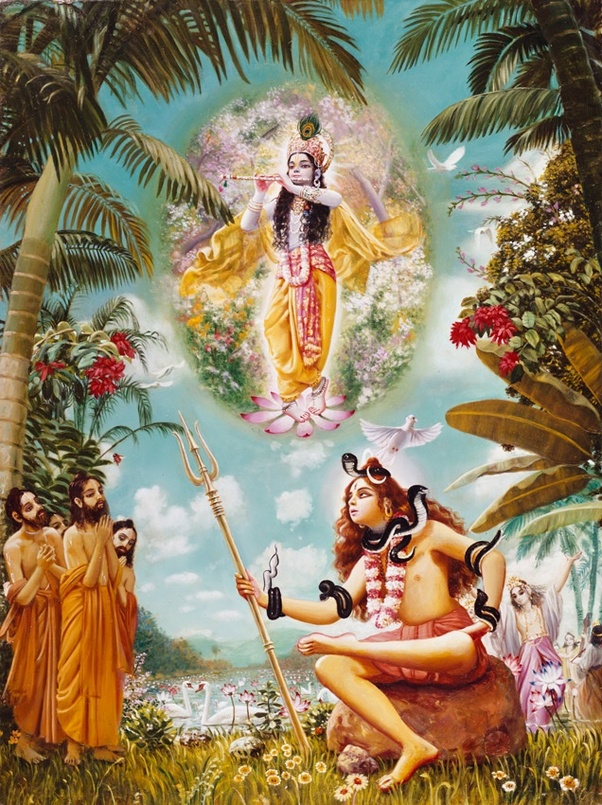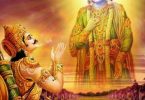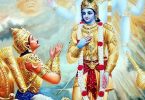Question: I was just going through the Bhagavatam and came across this section — 8.7.21 to 8.7.35 where the Prajapatis glorify Lord Siva as being the Supreme. This was a bit disturbing to my mind because I used to think that there is no ambiguity in the Bhagavatam regarding who is Supreme. Similarly, when the trinity of Lord Brahma, Lord Siva, and Lord Vishnu appear before the father of Dattatreya, they say that all three of them are same. (Canto 4)
So, how are we to declare that Lord Vishnu is the Supreme if there are references in even the Bhagavata Purana that the three principal demigods are same? I assume therefore that in other Puranas there will be many more such references. Kindly explain.
Answer by Romapada Swami: There is indeed no ambiguity in the Bhagavatam. Krishna is the fully Independent Supreme Personality of God, the cause of all causes (sarva karana karanam, janmady asya yatah). There are many other great personalities who are also Ishvaras (controllers), and are supreme in their own respective spheres – but they are all ‘dependently’ supreme, their powers as well as they themselves have their source in the Absolute Truth.
Srila Prabhupada makes this important distinction in the very beginning of his Introduction to Bhagavatam: “The conception of God and the conception of Absolute Truth are not on the same level. The Srimad-Bhagavatam hits on the target of the Absolute Truth. The conception of God indicates the controller, whereas the conception of the Absolute Truth indicates the summum bonum or the ultimate source of all energies. … Because there are different controllers for different managerial positions, there may be many small gods. According to the Bhagavad-gita any controller who has some specific extraordinary power is called a vibhutimat sattva, or controller empowered by the Lord. There are many vibhutimat sattvas, controllers or gods with various specific powers, but the Absolute Truth is one without a second. This Srimad-Bhagavatam designates the Absolute Truth or the summum bonum as the param satyam.” (Srimad Bhagavatam Introduction)
This param satyam is characterized as being the Cause of all causes, as Abhijna and Svarat (completely independent). No other living entity is either fully cognizant or fully independent, nor can be designated as sarva-karana-karanam; whatever cognizance or powers that the other Ishvaras have is derived from the Absolute Truth, Vasudeva.
Lord Shiva, in particular, is not just an ordinary living entity but an empowered incarnation of the Supreme Lord. Indeed, in a certain sense, Lord Shiva is non-different than Lord Vishnu, in one sense (Read very carefully how this is discussed in Cc in relation to Advaita Acarya)– just as much as yogurt is non-different than milk in a certain sense. Lord Shiva is but a transformation of LordVishnu by contact with matter — this is acknowledged in Brahma Samhita (http://vedabase.net/bs/5/45/en )
Although almost on the level of Vishnu, being but a transformation of the Lord in association with the modes of nature, Lord Shiva or Brahma are still neither independent nor equal in all respects with the Supreme Personality of Godhead.
Worshiping them does not yield the same result as worship of Vishnu. This is clarified by Suta Goswami in the opening pages of the Bhagavatam: (SB 1.2.22-24)
“Certainly, therefore, since time immemorial, all transcendentalists have been rendering devotional service to Lord Krishna, the Personality of Godhead, with great delight, because such devotional service is enlivening to the self.”
“The transcendental Personality of Godhead is indirectly associated with the three modes of material nature, namely passion, goodness and ignorance, and just for the material world’s creation, maintenance and destruction He accepts the three qualitative forms of Brahma, Vishnu and Shiva. Of these three, all human beings can derive ultimate benefit from Vishnu, the form of the quality of goodness.”
“Firewood is a transformation of earth, but smoke is better than the raw wood. And fire is still better, for by fire we can derive the benefits of superior knowledge [through Vedic sacrifices]. Similarly, passion [rajas] is better than ignorance [tamas], but goodness [sattva] is best because by goodness one can come to realize the Absolute Truth.”
This is further confirmed when we note that the prajapatis approach Lord Shiva with the inner motive of seeking his help to rectify the disturbing situation created by the poison, and not for the purpose of rendering unmotivated devotional service. (SB 8.7.35) One may adore and worship a powerful or respectable person but the words Bhakti or ‘bhaja’ indicating pure devotional service can be applied ONLY in relation to the Supreme Personality of Godhead and this alone can completely satisfy the self.
Generally, those who are after material benefits worship and adore the demigods, as apparent in the case of the prajapatis and even Atri Rishi, as well as in the messages of other puranas, in contrast to the prayers offered by such persons as Queen Kunti or Bhishma or Prahlada, free from any selfishly motivated desires. When a pure hearted soul does approach the demigods, they are given knowledge of pure devotion to Krishna – as in the case of Brahma to Narada (SB Canto 2 Ch 5) or Lord Shiva to the Pracetas (SB 4.24)
When one has a proper grasp of these fundamental principles of Bhagavatam and able to see everything in proper relation to the Absolute Truth, then there is no confusion or bewilderment when the relative supremacy of other exalted personalities are glorified in different parts of Vedic literatures. Just as the local newspaper may be full of descriptions of the mayor of the town – of his activities, his influence and so on, and once in a while a powerful mayor may even be glorified in the national newspaper and acclaimed even by the president himself for his outstanding accomplishments, but when seen in proper context, the mayor is neither equal to nor independent of the President.
Thus, as described in Brahma Samhita, the material creation is known as Devi dhama where Durgadevi reigns supreme, but above that is Mahesh Dham under the jurisdiction of Lord Shivawherein he is supreme, and even above that is Hari dhama – Lord Brahma worships the Primeval Lord Govinda “who has allotted their respective authorities to the rulers of those graded realms.” (Brahma Samhita 5.43)
This also is the purpose of Bhagavatam viz. to present the truth from the absolute perspective — the sages of Naimisaranya submit at the very outset that the scriptures are so varied and vast, and therefore request Suta to please present the ultimate conclusion of all scriptures in a clear and easily understandable way for the benefit of Kali yuga souls. (SB 1.1.10-11) For this reason it is very much stressed that one should undertake a systematic guided study and thoroughly grasp the principles of the beginning cantos of the Bhagavatam and the Bhagavad-gita – by so doing one can understand the entire range of Vedic scriptures without actually having to scrutinize through them all and figure out the conclusion. The messages of the later cantos including the passages you have referred to or any similar description is not contradictory when understood in the light of these elementary principles.
The prayers offered by the prajapatis to Lord Shiva are offered in the spirit of acknowledging his position as a guna-avatara, an empowered representative of the Supreme Lord, and not to LordShiva as an independent entity separate from Lord Vishnu nor as sarva-karana-karanam. Thus these glorifications are indirectly glorification of the supreme Lord or Paramatma, as much as the reception offered to the ambassador of a country is actually indirectly offered to the head of State.
This is explained in the purports to these texts “Lord Brahma and Lord Shiva are incarnations of Lord Vishnu and are known as shaktyavesa-avataras. They are endowed with a special power like that of Lord Vishnu, who is actually all-pervading in their activities. Therefore whenever prayers for protection are offered to Lord Shiva, actually Lord Vishnu is indicated, for otherwise LordShiva is meant for destruction. Lord Shiva is one of the ishvaras, or the controllers known as shaktyavesa-avataras. Therefore he can be addressed as having the qualities of Lord Vishnu. LordVishnu acts through Lord Shiva in the creation of the material world. Lord Shiva acts on behalf of Lord Vishnu.” (SB 8.7.21)
Furthermore, we learn from the Nectar of Devotion of the 64 qualities of Krishna –– as parts and parcels, living entities can possess up to 50 of these qualities, in minute quantity, whereas LordShiva possesses 55 of these qualities to a much greater degree — including qualities such as being changeless, all-cognizant, ever fresh, sac-cid-ananda (possessing an eternal blissful body, and possessing all mystic perfections. But Lord Krishna alone possesses all 64 qualities in their fullness, i.e. unlimitedly (Cf. NOD Ch 21)
Thus the glorifications offered by the prajapatis praising Lord Shiva’s omniscience etc, are certainly not false, but to be seen in the context of the bigger picture.
Sometimes even great devotees like Narada and Sukadeva Goswami are addressed as “bhagavan”, as being all-knowing and as being like the Supersoul (Ref. SB 1.2.2, 1.5.6-7 etc), but with the clear understanding that they are so empowered by virtue of their pure devotion to the Supreme Lord. Similarly, Yamaraja is described as being present as the witness in everyone’s heart – but by the empowerment of Paramatma, not independently. (Ref. SB 6.1.48)
Finally, everything is placed in proper perspective when we study what Lord Siva’s own response was to these prayers — Lord Shiva accepts the prayers with a clear understanding of who the Supreme Personality of Godhead is, as well as his own position in relation to the Lord. He accepts these prayers on behalf of the Supreme Lord Hari, just as a tax-collector accepts taxes not on his own account but on behalf of the government: “My dear gentle wife Bhavani, when one performs benevolent activities for others, the Supreme Personality of Godhead, Hari, is very pleased. And when the Lord is pleased, I am also pleased, along with all other living creatures. Therefore, let me drink this poison, for all the living entities may thus become happy because of me.” (SB 8.7.40)







